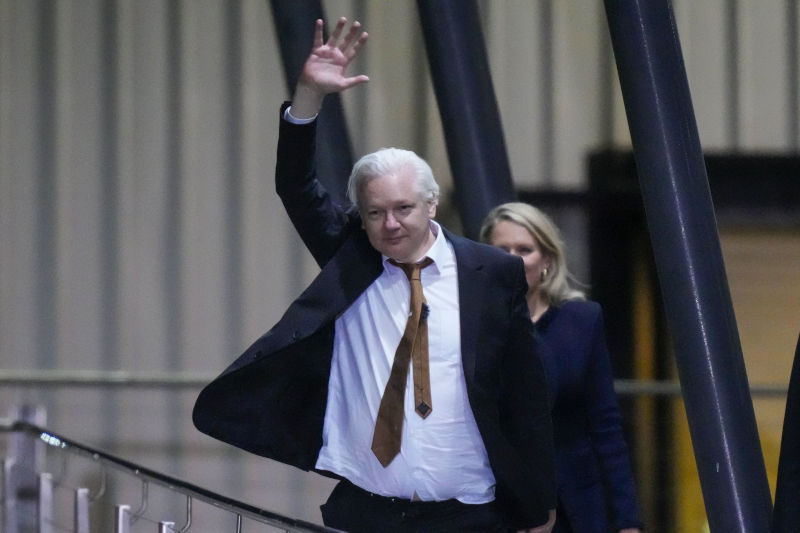Julian Assange’s case shows the danger of journalists being ensnared in legal entanglements when they do not play the power game.
For many of us diehard journalists, Julian Assange’s release from jail this week might have reawakened the journalistic fire in our bellies.
The WikiLeaks founder spent the last 12 years holed up in an embassy and a maximum-security prison for doing what journalists could only dream of – telling the truth by exposing the lies of governments, institutions, establishments and those in power.
Washington has pursued the Australian since he released in 2010 classified documents that revealed US abuse of prisoners, human rights violations and killing of civilians in the war it waged on Iraq and Afghanistan in the 2000s.
The now famous Collateral Murder video released by WikiLeaks showing the US army shooting civilians, including children, in Baghdad and laughing about it was very difficult viewing.
As Assange stepped onto Australian soil on Wednesday night a free man, having suffered for serving the basic democratic tenet of free speech and public interest, several things stand out, and they all do one thing – threaten journalism.
The plea deal that Assange signed to be free was no justice. It made him a criminal and set a possible dangerous precedent that if anyone exposed the crimes of the US government, they would be punished.
Journalists have long contended with authoritarian states which bully and kill them, but now we too have to worry about democratic states that ensnare journalists in legal entanglements.
Assange himself summarised it during his court hearing on Wednesday that the US First Amendment on free speech that he thought would protect him was at odds with the Espionage Act under which he was charged and sentenced for publishing US secrets.
That this saga has lasted this long is in itself a threat to journalists. It may be “rules-based” but its substantial outcome is no different from persecutions of journalists all over the world.
It is also no justice that no one in Washington has been charged with the murders and abuse of civilians that Assange’s WikiLeaks exposed. Focusing on Assange’s crime is a smokescreen for Washington’s wrongdoings.
Then, there are threats to journalism from within the profession.
Some journalists – and politicians – argued Assange did not follow the accepted methods of the craft, particularly in redacting names in the leaks he published, and was therefore reckless. They also called him narcissistic, vain and divisive.
Journalist Antony Loewenstein, however, said on Australian TV on Wednesday that it came down to this: “Julian wasn’t playing the game – the game that so many journalists play, of being close to power.”
Indeed, Assange had refused to play footsie with those in power, a technique that many journalists have adopted to a point that it has its own name: “access journalism”.
While being close to power could be good for scoops, it blurs the lines of journalistic independence. The dangerous result is the publishing of propaganda rather than news.
Assange also did things differently, drawing out jealousy and fear among mainstream journalists, who ironically would have done the same had they been in his shoes.
Having been on the same receiving end, surely doing things differently must add value to journalism? Experience tells me that following the crowd can mean missing important stories and essential evidence.
And as one man who fought for the truth starts a new life, other whistle-blowers are locked up or being pursued.
In Assange’s home country, Australia, concerns about protections for whistle-blowers are mounting. David McBride, who revealed war crimes committed by Australian soldiers in Afghanistan, was jailed in May and Richard Boyle, who exposed Australian tax office practices, lost his appeal last week.
The threats to journalism are bigger than ever.
But now is not the time for journalists to be silent, nor is it time to cow to those threats. They are in fact our cue to fire up even more.
Borrowing from a popular quote, “in a time of universal deceit, telling the truth is not only revolutionary, it is absolutely necessary”.
Republished from SCMP, 28 June, 2024
Su-Lin Tan joined the Post in 2020 after the Australian Financial Review where she covered housing and commercial property, Asian business and street talk and investigations. She is a qualified accountant and worked in investment banking and funds management both in London and Sydney before becoming a journalist.

